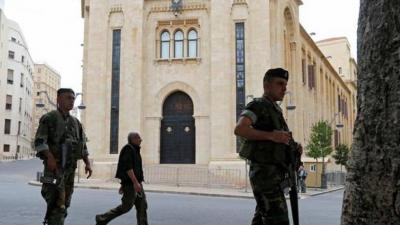As the country becomes increasingly embroiled in political infighting over the formation of a new government and continues to deteriorate day by day, calls are emerging for the parliament, as the primary constitutional institution, to take the initiative to restore order and stop the cycle of decline and disintegration affecting state institutions. Among these calls, the Association of Former Parliamentarians, after its administrative meeting yesterday, urged Speaker Nabih Berri to hold a public session to discuss pending issues, asserting that the parliament is sovereign. They also urged Prime Minister-designate Najib Mikati to expedite the formation of the government, emphasizing that the time is not in their favor and that important decisions need responsibility.
Prior to this call, a notable stance was taken by the "Forces of Change" bloc through a statement they issued the day before yesterday, calling for a historic stand in favor of the people, urging parliament members to collaborate on legislative work, which involves passing essential laws to restart growth and encouraging the Lebanese to pressure now for the election of a new president who prioritizes public interests during their term. They also pushed for the formation of a government that would lay out a genuine recovery plan to halt the economic hemorrhage and restart productive economic sectors.
What is the significance of this stance taken by these parliamentarians, and how can it be practically implemented within the parliament while interacting with other blocs and members? While some preferred not to comment, MP Dr. Elias Jaradeh stated in an interview with "The Homeland's Call" that "the call for a historic stand is akin to a cry for everyone to move beyond partisanship and collaborate in serving the country without obstinacy, especially in light of the lack of will and governance. Given that the executive authority is incapacitated, the parliament must take the initiative to devise a work plan and legislation with extraordinary thinking to avoid collapsing and a major explosion. We need to surpass the squabbling, as we do not have the luxury of time to lead the country to safety, and we extend our hands to everyone to build Lebanon."
Moreover, the Chairman of the Education Committee, MP Hassan Mourad, told "The Homeland's Call": "We believe in the policy of extending a hand to our political opponents; how much more so when most of the invitees are not in opposition to us. We hope that the language of statements will translate into actions and coordinated and practical steps on the ground, as until now, a large segment of the change-oriented colleagues still considers itself in conflict with most of the political forces present in the parliament, even those not affiliated with the ruling class."
Yacoubian: For the approval of reform laws
For her part, MP Paula Yacoubian told "The Homeland's Call": "A historic stand is needed because there are essential reform laws that have been shelved for years that must be approved, such as the Judicial Independence Law. Why hasn’t a deadline been set for the Minister of Justice who retracted it? The issue of back-and-forth games does not pass unnoticed, and there’s also the Capital Control Law and the laws demanded by the IMF for restructuring banks. The political forces in the parliament must take responsibility for passing these laws, and we want a rescue president because many Lebanese are outside the system, and there is a transformative spirit among many successful individuals. We will not propose names for burning, but when we reach the entitlement, there will be many personalities beyond personal, familial, and partisan interests."
Hashimi: A bold step
The call from the parliamentarians was well-received by the independent members, and on their behalf, MP Dr. Bilal Hashimi welcomed it, saying to "The Homeland's Call": "This proposal is acceptable and a bold step, and we encourage it because the people's situation can no longer endure. The aim is to work to exit the crisis, and these ideas were already put forward by the independent MPs since the session to elect the Bureau of the Parliament. I have called after the non-binding consultations for a swift collaboration to form the government to alleviate the people’s suffering."
Lastly, it is worth noting that the Speaker of the Parliament may convene a legislative session based on the concept of "necessary legislation" at any moment, a practice he has previously implemented during times when a caretaker government existed. This interpretation is particularly relevant if the prospects for forming a new government remain blocked and as the timeline for the presidential elections approaches at the beginning of next September, with the country in dire need of laws and legislations similar to those proposed the day before yesterday to the Committee of Public Works and Transport.




